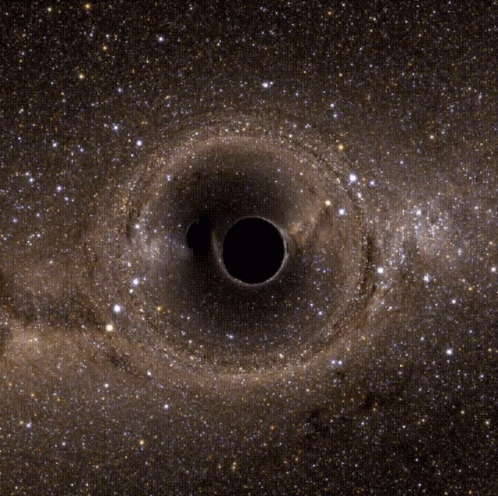
Hey there, young space explorers! Today, we're going on a journey into the deep, dark, and mysterious world of black holes. These cosmic wonders are like vacuum cleaners of the universe, sucking everything into their clutches, even light! But that's not all; they hide a puzzle that scientists have been trying to solve for years – the information paradox.
What's a Black Hole, Anyway?
Before we dive into the puzzling paradox, let's quickly understand what a black hole is. Imagine a star much bigger than our Sun. When such a star runs out of fuel, it collapses under its own weight and becomes incredibly dense. This creates a super-strong gravitational pull that not even light can escape from. That's a black hole!
Now, let's talk about Stephen Hawking, a famous scientist who made a mind-blowing discovery. He found out that black holes aren't completely black! They emit something called "Hawking radiation." This radiation is tiny particles that sneak out of the black hole, making it lose a little bit of mass over time.
Here's the strange part: this radiation seems to carry away information from the black hole, like the temperature and size. But wait, didn't we just say nothing can escape a black hole's grasp? This is where the mystery begins.

The Information Paradox
Imagine you threw a book into a black hole. According to our understanding of black holes, that book should be lost forever. But Hawking's discovery suggests that some information about the book (like what it's made of) might escape in the form of Hawking radiation. This seems to break the rules of the universe!
This clash of ideas is what scientists call the "information paradox." It's like a cosmic puzzle that has kept scientists scratching their heads for years. How can information get out of a black hole if nothing can escape it?
Recent Developments and Proposed Solutions
In recent years, scientists have been busy trying to solve this puzzle. They've come up with some interesting ideas:
Holography: Imagine you have a 3D object, but all the information about it is stored on a 2D surface. Some scientists think that black holes might work like this – all the stuff that falls in gets encoded on the surface of the black hole. It's like a cosmic magic trick!
Firewalls: Another idea is that when something falls into a black hole, it gets burned up at the edge, creating a "firewall" of energy. This is a bit like a protective shield around the black hole, but it's still a big debate in the scientific world.
Hidden Portals: Some theories suggest that black holes might connect to other parts of the universe through hidden portals. Imagine you could enter a black hole and come out somewhere else in space or time. These portals could be the key to understanding the information paradox.

But remember, these ideas are still being explored, and scientists are working hard to figure out which one is right, if any!
The Cosmic Puzzle Continues
So, there you have it, young space explorer! Black holes are not only fascinating but also full of mysteries. The information paradox is like a riddle waiting to be solved. Scientists are on a quest to unravel the secrets of black holes, Hawking radiation, and the very fabric of our universe.
As you grow older, who knows? Maybe you'll be the one to crack this cosmic code and help us understand the incredible enigma of black holes even better. Until then, keep gazing at the stars and dreaming of the mysteries that await us in the vast universe!

Thanks for you attention!
Read more here
- Hawking, S. W., & Jackson, M. (2001). A brief history of time (Vol. 666). New York: Bantam Books.
- Giddings, S. B. (1995). The black hole information paradox. arXiv preprint hep-th/9508151.
- https://science.nasa.gov/astrophysics/focus-areas/black-holes

Thanks for your contribution to the STEMsocial community. Feel free to join us on discord to get to know the rest of us!
Please consider delegating to the @stemsocial account (85% of the curation rewards are returned).
You may also include @stemsocial as a beneficiary of the rewards of this post to get a stronger support.